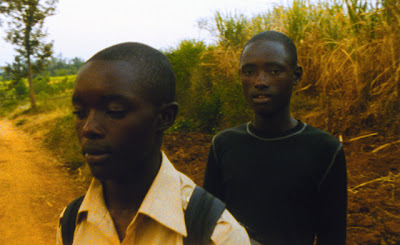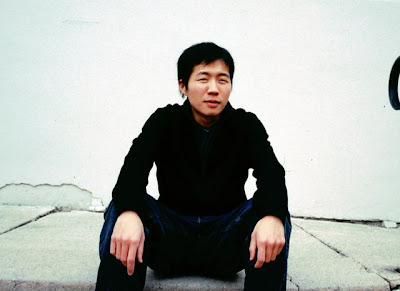Now Available to Own
Photo Slideshow
Photo Slideshow
Join Film Movement
Orphaned and alone on the streets of Kigali following the slaughter of his parents in the Rwandan genocide, both Munyurangabo's wish for revenge and the will to carry it out grew right along with the boy as time passed. Yet it wasn't until the windfall of not only where he was but also what was going on at the time that offered Munyurangabo the chance to acquire the weapon and therefore precisely the right way to complete the task that sent him walking back from Kigali for the kill.
Machete in his backpack and with his best friend and brother surrogate, Sangwa at his side-- the two journey from the capital city towards the homes and any remaining family they have left after abandoning their old surroundings years earlier to try and earn a living in Kigali.
In Kigali, the two kids hadn't let their opposite backgrounds get in the way of their friendship by ultimately forming an unlikely "family" based on necessity and similar horror. Yet while their dynamic most likely illustrates the promise that the future of Rwanda may hold for those who want to look ahead, the trek towards their previous lives is a treacherous one that makes them confront both Rwanda's past as well as their own.
For once the two embark on a brief detour at the home of Sangwa on the way towards their murderous final destination, the divisive history of their nation moves back into focus in the form of Sangwa's suspicious and embittered father. Instead of violent revenge, he uses words like a machete to drive a wedge between the two boys by reminding them that, “Hutus and Tutsis are supposed to be enemies."
The resulting film marks an amazingly ambitious directorial debut for the former biology major at Yale University who was raised as the first generation son of Korean immigrants on a rural farm in Arkansas. Inspired after Chung and his collaborators Jenny Lund and Samuel Anderson ventured to Rwanda to teach a filmmaking and photography course to Rwandan at-risk youths, the filmmakers returned to complete the film in just eleven days.
Moreover to maintain its authenticity, Lee Isaac Chung's naturalistic Munyurangabo is filmed in a language the director doesn't speak. In doing so, the award-winning film festival release Munyurangabo also became the first feature length motion picture in history to utilize the Kinyarwanda language.
An assured and impressive promise of what's to come, Chung's crafted a subtle work that seems to be an internationally contemporary hybrid of neorealism and docudrama. Likewise it's the type of movie that Film Movement gravitates to releasing as part of their DVD-of-the-Month subscription service.
Holding its own among their catalog of releases, it's one of numerous features centered on children trying to navigate a political and overly complicated terrain with which they can't quite come to terms. Therefore, Munyurangabo transports viewers right into the heart of a country that is likewise trapped between the past and the future. And thus via Munyurangabo and Sangwa, Chung has effectively chosen the right guides to lead us through Rwanda's bewildering present.
An arresting portrait of life being lived that blurs the lines between creative narrative filmmaking and documentary, Munyurangabo is a film that's tough to shake. Additionally it's one that-- aside from its vengeance filled plight--due to the responsible handling by Chung and the crew, could also be played in high schools to begin a conversation about genocide, Rwanda and the way that art can be used to bridge the divide between cultures and generations.
Text ©2009, Film Intuition, LLC; All Rights Reserved. http://www.filmintuition.com
Unauthorized Reproduction or Publication Elsewhere is Strictly Prohibited.




















